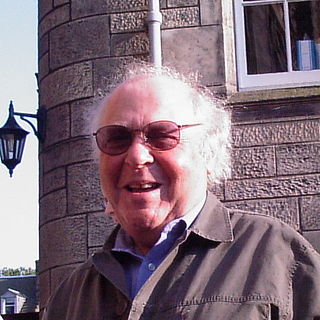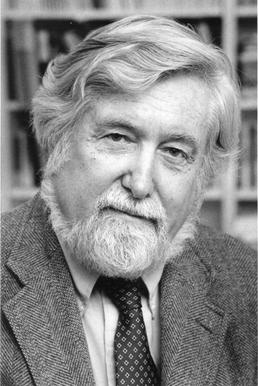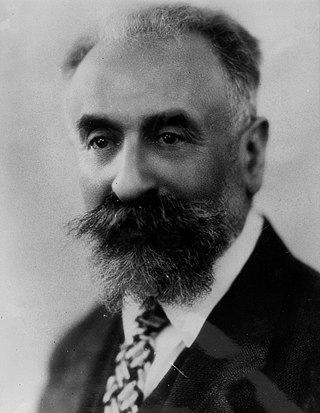A gift economy or gift culture is a system of exchange where valuables are not sold, but rather given without an explicit agreement for immediate or future rewards. Social norms and customs govern giving a gift in a gift culture; although there is some expectation of reciprocity, gifts are not given in an explicit exchange of goods or services for money, or some other commodity or service. This contrasts with a barter economy or a market economy, where goods and services are primarily explicitly exchanged for value received.

Marshall David Sahlins was an American cultural anthropologist best known for his ethnographic work in the Pacific and for his contributions to anthropological theory. He was the Charles F. Grey Distinguished Service Professor Emeritus of Anthropology and of Social Sciences at the University of Chicago.
Economic anthropology is a field that attempts to explain human economic behavior in its widest historic, geographic and cultural scope. It is an amalgamation of economics and anthropology. It is practiced by anthropologists and has a complex relationship with the discipline of economics, of which it is highly critical. Its origins as a sub-field of anthropology began with work by the Polish founder of anthropology Bronislaw Malinowski and the French Marcel Mauss on the nature of reciprocity as an alternative to market exchange. For the most part, studies in economic anthropology focus on exchange.

Clifford James Geertz was an American anthropologist who is remembered mostly for his strong support for and influence on the practice of symbolic anthropology and who was considered "for three decades... the single most influential cultural anthropologist in the United States." He served until his death as professor emeritus at the Institute for Advanced Study, Princeton.

Marcel Mauss was a French sociologist and anthropologist known as the "father of French ethnology". The nephew of Émile Durkheim, Mauss, in his academic work, crossed the boundaries between sociology and anthropology. Today, he is perhaps better recognised for his influence on the latter discipline, particularly with respect to his analyses of topics such as magic, sacrifice and gift exchange in different cultures around the world. Mauss had a significant influence upon Claude Lévi-Strauss, the founder of structural anthropology. His most famous work is The Gift (1925).
Political anthropology is the comparative study of politics in a broad range of historical, social, and cultural settings.

Arjun Appadurai is an Indian-American anthropologist recognized as a major theorist in globalization studies. In his anthropological work, he discusses the importance of the modernity of nation states and globalization. He is the former University of Chicago professor of anthropology and South Asian Languages and Civilizations, Humanities Dean of the University of Chicago, director of the city center and globalization at Yale University, and the Education and Human Development Studies professor at NYU Steinhardt School of Culture.
Robert Hinrichs Bates is an American political scientist specializing in comparative politics. He is Eaton Professor of the Science of Government in the Departments of Government and African and African American Studies at Harvard University. From 2000–2012, he served as Professeur associé, School of Economics, University of Toulouse.
Meyer Fortes FBA FRAI was a South African-born anthropologist, best known for his work among the Tallensi and Ashanti in Ghana.
Prickly Paradigm Press is a new incarnation of Prickly Pear Pamphlets, which was started in 1993, in Cambridge, England, by anthropologists Keith Hart and Anna Grimshaw. Together they published a series of ten pamphlets on a range of topics in anthropology, the history of science, and ethnographic film. In 1998, Mark Harris and Matthew Engelke took over the press, expanding its operations in the world market and adding a select few titles to its list. In 2001, Marshall Sahlins took over the press, renamed it Prickly Paradigm, and re-published his own pamphlet and also Richard Rorty's. In 2004, Justin Shaffner scanned the original Prickly Pear pamphlets into a PDF format and made them freely available for distribution on the Internet.

Bruce Kapferer is an Australian anthropologist. He is best known for his work on Sri Lanka, Australia and Zambia. He has been at the forefront of anthropological debate for over three decades. He was honoured with Huxley Prize in 2011 by the Royal Anthropological Institute of Great Britain.

Pranab Bardhan is an Indian economist who has taught and worked in the United States since 1979. He is Professor Emeritus of Economics at the University of California, Berkeley.

Don Kalb is a Dutch anthropologist, full professor of social anthropology at the University of Bergen, and an assistant professor of social sciences and cultural anthropology at Universiteit Utrecht. For many years, Kalb was a professor of sociology and social anthropology at the Central European University.
The anthropology of development is a term applied to a body of anthropological work which views development from a critical perspective. The kind of issues addressed, and implications for the approach typically adopted can be gleaned from a list questions posed by Gow (1996). These questions involve anthropologists asking why, if a key development goal is to alleviate poverty, is poverty increasing? Why is there such a gap between plans and outcomes? Why are those working in development so willing to disregard history and the lessons it might offer? Why is development so externally driven rather than having an internal basis? In short, why is there such a lack of planned development?
Social anthropology is the study of patterns of behaviour in human societies and cultures. It is the dominant constituent of anthropology throughout the United Kingdom and much of Europe, where it is distinguished from cultural anthropology. In the United States, social anthropology is commonly subsumed within cultural anthropology or sociocultural anthropology.
Political economy in anthropology is the application of the theories and methods of historical materialism to the traditional concerns of anthropology, including but not limited to non-capitalist societies. Political economy introduced questions of history and colonialism to ahistorical anthropological theories of social structure and culture. Most anthropologists moved away from modes of production analysis typical of structural Marxism, and focused instead on the complex historical relations of class, culture and hegemony in regions undergoing complex colonial and capitalist transitions in the emerging world system.

Gerald Mars is a British social anthropologist who works across disciplines to understand the nature and problems of modern industrial society. His work draws on the grid-group theory of Mary Douglas, on his fieldwork in Canada, Britain, Israel, and the former Soviet republics, and on his own experience. His work has often centred on workplace crime, and his best-known book, still often discussed, is Cheats at Work (1982).

William M. Maurer is an American academic scholar of legal and economic anthropology. He currently serves as the dean of the School of Social Sciences at the University of California, Irvine. He has conducted research on money, finance, economy, and law, including the off-shore financial services industry in the Caribbean, alternative currencies, Islamic finance, mobile money, and traditional and emerging payment technologies, as well as cryptocurrencies like Bitcoin and related blockchain technologies. He has been called the “doyen” of the subfield of the anthropology of finance. Maurer is also the founding director of the Institute for Money Technology and Financial Inclusion, a research institute at UC Irvine funded by the Bill & Melinda Gates Foundation, and a fellow of the Filene Research Institute. He was previously the founding co-director of the Intel Science and Technology Center in Social Computing, also at UCI.
Chris Hann is a British social anthropologist who has done field research in socialist and post-socialist Eastern Europe and the Turkic-speaking world. His main theoretical interests lie in economic anthropology, religion, and long-term history. After holding university posts in Cambridge and Canterbury, UK, Hann has worked since 1999 in Germany as one of the founding Directors of the Max Planck Institute for Social Anthropology in Halle/Saale. Hann has made significant contributions to the subfield of economic anthropology.
Christopher A. Gregory is an Australian economic anthropologist. He is based at Australian National University (ANU) in Canberra, and has also taught at University of Manchester- where he was made Professor of Political and Economic Anthropology. He studied Economics at University of New South Wales and ANU before pursuing anthropology, following a period in Papua New Guinea. His main research has been in Papua New Guinea and Bastar District, central India, and he also co-authored a research methods manual for economic anthropology, 'Observing the Economy', with Jon Altman.








